Nigeria
Lagos, Nigeria’s commercial capital, has endured a very tough year. The main pointers being a COVID-19 forerunner in Africa’s most populous nation, through to the #EndSars protests and its aftermath.
When the coronavirus took off in late 2019, the World Health Organization, WHO; cautioned that it was only a matter of time before the virus was going to spread to other parts of the world. It did arrive in Africa on February 14, via Egypt.
Lagos registers Nigeria’s index case
Nigeria also got her index case on February 27 when an Italian national working in the country tested positive for the virus after arriving in Lagos on a return flight from Milan.
The state and federal government knowing the possible impact of a mass spread among the population took immediate steps to contain and combat the virus. Since recording Nigeria’s first case, Lagos has been in an unassailable lead relative to the virus stats in the country.
The state was beneficiary of massive financial contributions by the private sector in efforts to help combat the virus. Then the first federal lockdown was imposed in early May, a measure that affected Lagos, Abuja and Ogun state.
A notable COVID-19 incident had to do with the death in Lagos of Mallam Abba Kyari, chief of staff to president Buhari. Kyari had contracted the virus and was sent to Lagos to receive treatment. He died there and was returned to Abuja for burial.
State governor Babajide Sanwo-olu also contracted the virus late this year, this was after Health Commissioner Akin Abayomi had also contracted and recovered. The two men are at the heart of the virus response in the state.
#EndSars protests gain global traction
The trigger for by far Africa’s most sustained protests of 2020 was in Nigeria’s Delta State when a special police unit squad shot and killed a man in a viral video.
The #EndSars movement was born as thousands of young Nigerians poured onto the streets especially in western Nigeria demanding the disbandment of the Special Anti-Robbery Squad, SARS. Beyond ending SARS, a demand for concrete police reforms and justice for victims.
When eventually the president ordered the disbanding of SARS, police were tasked with constituting a new unit. The police chief announced the formation of the Special Weapons And Tactics unit, SWAT.
But the protesters insisted that it was a façade to get them off the streets. They pressed on with protests as Lagos became an epicentre of sorts for the marches. Effective mobilization meant that protests were sustained by contributions raised via online platforms.
At a point when alleged thugs tried to infiltrate the ranks of the protests; security, feeding, legal and medical support was offered by protest organizers.
The hashtag accompanying the protests, #EndSars, gained global traction as personalities at home, across the continent and the world at large queued in to support the cause. To mention a few, Lewis Hamilton through to Rihanna and Beyonce, all tweeted in support.
Lekki tollgate incident and justice panels
Lagos State governor Sanwo-olu was at the scene of protests to assure people of government support for their cause. He entreated protesters to come to the negotiation table with the view to contribute to the reforms and justice demands.
But the leader-less protests will roll on, not even when a curfew had been imposed on October 20 by the state government. The strategic Lekki tollbooth later that evening became the scene of a confrontation.
Activists say the military had been deployed to forcibly disperse the crowd for which reason live bullets were discharged killing protesters. The military has given a series of accounts from flat denial to limited involvement at request of the state government.
The federal government tasked all state governments to also institute judicial panels to listen to victims of SARS brutality across the years. The Lagos panel has been hearing from different parties as has panels sitting in different parts of the country.
The shooting incident will subsequently trigger deadly protests and mass looting across Lagos, which incidents also extended to other parts especially the southwest.
From private media houses, police stations, hospitals, palaces and prisons, hoodlums attacked and destroyed properties in a pattern the state government described as “unprecedented” in history.
The rebuilding process has become one of the main tasks being undertaken by the Lagos State government. Lagos undoubtedly endured a tough 2020 but hopes to recover fully and continue its growth trajectory.



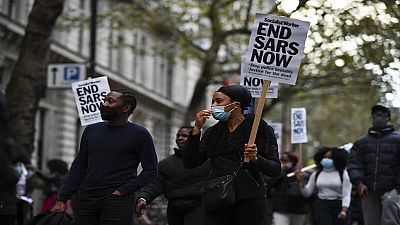

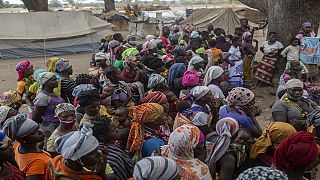
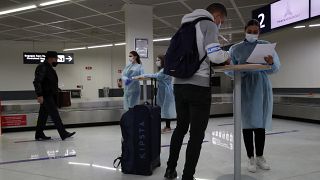
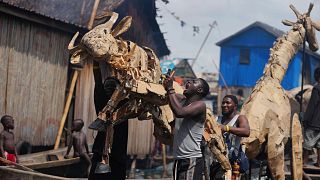
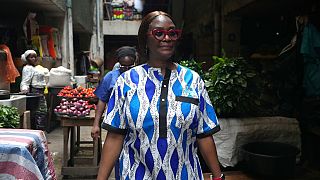
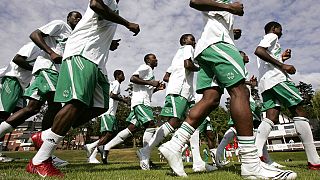



Go to video
Funeral held in Kenya for TikTok content moderator
Go to video
Scores killed in attack by gunmen in central Nigeria
Go to video
Air Algeria starts flights to Nigeria
01:09
Yinka Shonibare explores identity and hybridity in new Madagascar exhibition
00:57
Nigeria: Tinubu's effort to resturcture the ailing oil sector
Go to video
Lassa fever kills 118 in Nigeria since the start of the year